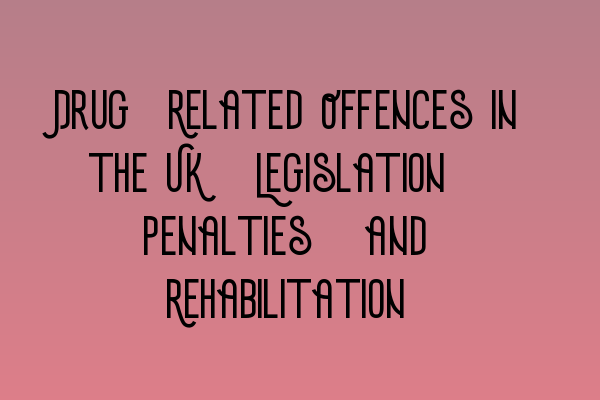Drug-Related Offences in the UK: Legislation, Penalties, and Rehabilitation
Drug-related offences are serious offences under the UK law. It is essential to understand the legislation, penalties, and rehabilitation programs associated with such offences. In this blog post, we will shed light on the key aspects of drug-related offences in the UK.
Legislation
The legislation regarding drug-related offences in the UK primarily revolves around the
Misuse of Drugs Act 1971. This legislation classifies drugs into different categories known as Class A, Class B, and Class C, with Class A drugs being the most harmful and carrying the harshest penalties.
Class A drugs include substances like cocaine, heroin, ecstasy, LSD, and methamphetamine. Class B drugs include cannabis, amphetamines, and synthetic cannabinoids, while Class C drugs include substances like anabolic steroids and some tranquilizers.
It is important to note that possession, production, and distribution of drugs without a valid prescription are considered criminal offences under this legislation.
Penalties
The penalties associated with drug-related offences vary based on factors such as the type and quantity of drugs involved, the offender’s role, and their prior criminal history. The courts take drug offences seriously and impose strict penalties to discourage drug-related activities.
For possession, the penalties can range from fines to imprisonment, depending on the class of drug and the specific circumstances of the case. For example, possession of Class A drugs can lead to imprisonment for up to 7 years and an unlimited fine. Possession of Class B drugs can lead to imprisonment for up to 5 years and an unlimited fine.
For production and distribution, the penalties are even more severe. Offenders can face significant terms of imprisonment and hefty fines. Repeat offenders or those involved in large-scale drug operations may face even harsher penalties.
It is crucial to understand that penalties for drug-related offences can have long-term consequences, affecting employment opportunities, travel, and personal relationships. Seeking legal representation and understanding the options for rehabilitation can significantly benefit individuals facing drug-related charges.
Rehabilitation
Rehabilitation plays a vital role in the criminal justice system’s approach to drug-related offences in the UK. Recognizing the importance of addressing addiction and supporting offenders in their journey towards recovery, the legal system offers various rehabilitation programs.
These programs aim to address the underlying causes of drug addiction, provide support for individuals struggling with substance abuse, and help them reintegrate into society as productive and law-abiding citizens. Rehabilitation programs may include counseling, therapy, and support groups, providing the necessary tools for individuals to break free from the cycle of drug addiction.
If you or someone you know is facing drug-related charges, it is crucial to consult with a qualified solicitor who specializes in criminal law. They can guide you through the legal process, represent you in court, and help explore options for rehabilitation.
Conclusion
Drug-related offences in the UK carry severe penalties, including imprisonment and fines. Understanding the legislation and consequences associated with drug offences is essential to make informed decisions and seek appropriate legal representation.
Rehabilitation programs can play a crucial role in supporting individuals battling drug addiction and helping them reintegrate into society. Seeking legal advice from experienced solicitors can provide the necessary guidance and support throughout this challenging process.
